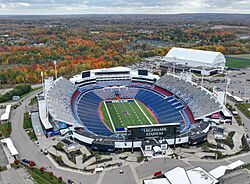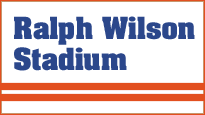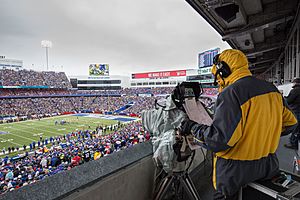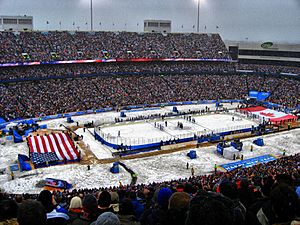Highmark Stadium (New York) facts for kids
|
The Ralph
|
|
 |
|

Highmark Stadium in 2022
|
|
| Full name | Highmark BlueCross BlueShield Stadium |
|---|---|
| Former names | Rich Stadium (1973–1997) Ralph Wilson Stadium (1998–2015) New Era Field (2016–2019) Bills Stadium (2020) |
| Address | 1 Bills Drive |
| Location | Orchard Park, New York, U.S. |
| Coordinates | 42°46′26″N 78°47′13″W / 42.774°N 78.787°W |
| Elevation | 770 ft (235 m) AMSL |
| Owner | Erie County |
| Operator | Buffalo Bills |
| Capacity | 71,608 (current) |
| Surface | A-Turf Titan 50 (2011–present) AstroPlay (2003–2010) AstroTurf (1973–2002) |
| Construction | |
| Broke ground | April 4, 1972 |
| Opened | August 17, 1973 |
| Renovated | 1998, 2013 |
| Construction cost | US$22 million (1973) ($145 million in 2022 dollars) |
| Architect | HNTB Populous (2013 renovation) |
| Structural engineer | David M. Berg & Associates Inc. |
| General contractor | Frank Schoenle Construction |
| Tenants | |
| Buffalo Bills (NFL) 1973–2026 Syracuse Orange (NCAA) 1979 |
|
Highmark Stadium is a famous sports stadium in Orchard Park, New York. It is the home field for the Buffalo Bills, a professional football team in the National Football League (NFL). People sometimes call it "The Ralph." The stadium first opened in 1973.
Over the years, the stadium has had a few different names. It started as Rich Stadium. Then it became Ralph Wilson Stadium, named after the Bills' founder. Later, it was called New Era Field and then Bills Stadium for a short time. Today, it is known as Highmark Stadium.
Contents
The Story of Highmark Stadium
Building a New Home for the Bills
The Buffalo Bills started playing way back in 1960. For their first 13 seasons, they played at a place called War Memorial Stadium. This old stadium was built in 1938. It was getting old and too small for an NFL team. The league said stadiums needed at least 50,000 seats.
So, in 1971, the team's owner, Ralph Wilson, looked for a new place. He even thought about moving the team to another city. This made everyone realize they needed a new stadium fast! Highmark Stadium opened in 1973.
How the Stadium Got Its Name
In 1972, a food company called Rich Products made a deal. They paid money for the stadium to be named "Rich Stadium." This was one of the first times a company bought the naming rights for a sports venue.
After 25 years, the deal ended in 1998. The stadium was then renamed Ralph Wilson Stadium to honor the team's founder.
Later, in 2016, the stadium became New Era Field after a deal with New Era Cap Company. But in 2020, New Era Cap asked to end their agreement. For a short time, the stadium was simply called Bills Stadium.
Finally, in 2021, the stadium got its current name, Highmark Stadium. This happened after a 10-year agreement with Highmark Blue Cross Blue Shield.
Exciting Games and Records
Memorable Moments on the Field
The first NFL game at the stadium was on September 30, 1973. The Bills won 9–7 against the New York Jets. The first playoff game there was in 1989. The Bills beat the Houston Oilers 17–10.
The Bills have beaten every other NFL team at least once in this stadium. They have a perfect record against three teams: the Arizona Cardinals (5–0), Green Bay Packers (7–0), and Tampa Bay Buccaneers (3–0).
The last regular season home game for the Bills at Highmark Stadium is planned for early 2026. They will play against the New York Jets, the same team they faced in their very first game there.
Stadium Design and Cool Features
Highmark Stadium is an open-air stadium. It can hold about 71,608 fans. The field has never had real grass. It has always used artificial turf. The current turf is called A-Turf Titan.
The stadium has been updated many times. In 1984, more seats were added. In 1994, big changes included new clubs with glass enclosures. A huge video scoreboard was also added, which was the biggest in the U.S. at the time!
More renovations happened in 1998 and 2007. These added bigger seats, luxury boxes, and new HD video boards. In 2012, a big agreement led to $130 million in improvements. These included new entrance gates, more video boards, and a new team store. A statue of team founder Ralph Wilson was also added in 2015.
Buffalo is a very windy city because it's near Lake Erie. This makes playing at Highmark Stadium tricky for kickers. The stadium's design lets the wind swirl down onto the field.
Seating Capacity Over the Years
The number of seats in the stadium has changed with different renovations:
| Years | Capacity |
|---|---|
| 1972–1983 | 80,020 |
| 1984–1994 | 80,290 |
| 1995–1998 | 80,024 |
| 1999–2000 | 75,339 |
| 2001–2007 | 73,967 |
| 2008–2013 | 73,079 |
| 2014 | 71,857 |
| 2015 | 71,870 |
| 2016–present | 71,608 |
Other Events at the Stadium
Beyond Football Games
While it's mainly for football, Highmark Stadium has hosted other events. The field is designed for NFL football. This makes it hard to hold other sports like soccer or baseball there.
However, the stadium does host high school football playoffs every year. It also hosted the opening ceremony for the 1993 Summer Universiade, a big international sports event.
College Football Games
Syracuse University played two home games at the stadium in 1979. This was when their own stadium was being rebuilt.
In 2013, the stadium hosted a college game between the UB Bulls and the Bowling Green Falcons.
| Date | Away Team | Result | Home Team | Attendance |
|---|---|---|---|---|
| September 29, 1979 | Washington State | 25–52 | Syracuse | 10,004 |
| October 27, 1979 | Miami (FL) | 15–25 | Syracuse | 7,729 |
| November 29, 2013 | Bowling Green | 24–7 | Buffalo | 26,226 |
Ice Hockey on the Field
On January 1, 2008, the stadium hosted the first-ever NHL Winter Classic. The Buffalo Sabres played against the Pittsburgh Penguins. The Penguins won in a shootout in front of over 71,000 fans!
In 2017, a game between the U.S. and Canada was held there. It was part of the 2018 World Junior Ice Hockey Championships.
| Date | Away Team | Result | Home Team | Spectators |
|---|---|---|---|---|
| January 1, 2008 | Pittsburgh Penguins | 2–1 (SO) | Buffalo Sabres | 71,217 |
| December 29, 2017 | 3-4 (SO) | 44,592 |
Big Concerts and Shows
Many famous musicians have played concerts at Highmark Stadium. The first concert was in 1974. Bands like The Rolling Stones, Grateful Dead, and The Who have played there multiple times.
Some concerts were very large, like The Jacksons' Victory Tour in 1984. Billy Joel and Elton John also performed together.
After 2001, there were no concerts for 14 years. This was because other smaller venues became popular. But concerts returned in 2015 with The Rolling Stones. More recently, artists like Beyoncé, Jay-Z, Garth Brooks, and Metallica have performed.
| Date | Artist | Opening act(s) | Tour / Concert name | Attendance | Revenue | Notes |
|---|---|---|---|---|---|---|
| July 26, 1974 | Emerson Lake & Palmer | James Gang Lynyrd Skynyrd |
Brain Salad Surgery Tour | — | — | |
| July 12, 1975 | Yes | Johnny Winter J. Geils Band |
Relayer Tour | — | — | |
| August 8, 1975 | The Rolling Stones | — | Tour of the Americas '75 | — | — | |
| August 7, 1976 | Elton John | Boz Scaggs | Louder Than Concorde Tour | — | — | |
| June 19, 1977 | Lynyrd Skynyrd | Blue Öyster Cult Ted Nugent Starz |
Street Survivors Tour | — | — | |
| July 4, 1978 | The Rolling Stones | Journey April Wine Atlanta Rhythm Section |
US Tour 1978 | — | — | |
| July 28, 1978 | Fleetwood Mac | Pablo Cruise Bob Welch Foreigner |
Rumours Tour | — | — | |
| September 27, 1981 | The Rolling Stones | Journey George Thorogood & the Destroyers |
American Tour 1981 | 75,000 | $1,125,000 | |
| September 26, 1982 | The Who | David Johansen The Clash |
The Who Tour 1982 | 80,000 / 80,000 | $1,200,000 | |
| August 25, 1984 | The Jacksons | — | Victory Tour | 94,000 | $2,820,000 | |
| August 26, 1984 | ||||||
| July 4, 1986 | Bob Dylan Tom Petty and the Heartbreakers |
Grateful Dead | True Confessions Tour | 63,850 / 75,000 | $1,277,000 | Portions of this show were broadcast as part of VH1's coverage of Farm Aid II |
| June 19, 1988 | Van Halen Scorpions |
Dokken Metallica Kingdom Come |
Monsters of Rock | — | — | |
| July 4, 1989 | Grateful Dead | 10,000 Maniacs | — | — | — | This show was documented on the CD/DVD Truckin' Up to Buffalo. |
| July 18, 1989 | The Who | — | The Who Tour 1989 | — | — | |
| July 25, 1992 | Guns N' Roses Metallica |
Faith No More | Guns N' Roses/Metallica Stadium Tour | 44,833 / 59,326 | $1,322,574 | |
| June 13, 1993 | Grateful Dead | — | — | — | — | |
| July 14, 1994 | Billy Joel Elton John |
— | Face to Face 1994 | 57,058 / 57,500 | $2,380,834 | |
| October 8, 1997 | The Rolling Stones | Blues Traveler | Bridges to Babylon Tour | 30,404 / 35,000 | $1,655,588 | |
| June 3, 2000 | Tim McGraw Kenny Chesney |
— | — | — | — | Tim McGraw and Kenny Chesney were arrested on charges of stealing a horse owned by the Erie County Sheriff's Department. |
| July 21, 2000 | Dave Matthews Band | Ozomatli Ben Harper & The Innocent Criminals |
— | — | — | |
| June 10, 2001 | NSYNC | BBMak | PopOdyssey | 43,406 / 55,874 | $2,175,436 | These two concerts were the last at the stadium for more than a decade. |
| June 20, 2001 | Dave Matthews Band | Angelique Kidjo Macy Gray |
2001 Tour | — | — | |
| July 11, 2015 | The Rolling Stones | St. Paul & The Broken Bones | Zip Code Tour | 49,552 / 49,552 | $8,634,557 | This is the first concert at the stadium since 2001. |
| September 3, 2015 | One Direction | Icona Pop | On the Road Again Tour | 38,137 / 38,137 | $2,700,736 | |
| August 16, 2017 | Guns N' Roses | Live | Not In This Lifetime... Tour | 32,245 / 35,630 | $2,626,070 | |
| September 5, 2017 | U2 | Beck | The Joshua Tree Tour 2017 | 41,106 / 41,106 | $4,269,245 | |
| August 18, 2018 | Beyoncé Jay-Z |
Chloe x Halle, DJ Khaled | On the Run II Tour | 38,053 / 38,053 | $4,262,076 | |
| August 14, 2021 | Billy Joel | — | Billy Joel in Concert | — | — | |
| July 23, 2022 | Garth Brooks | — | The Garth Brooks Stadium Tour | — | — | |
| August 10, 2022 | Def Leppard Mötley Crüe |
Poison Joan Jett & the Blackhearts Tuk Smith and The Restless Hearts Classless Act |
The Stadium Tour | — | — | |
| August 11, 2022 | Metallica | Greta Van Fleet Ice Nine Kills |
2021–2022 tour | — | — | |
| April 19, 2024 | Luke Combs | — | Growin’ Up And Gettin’ Old Tour | — | — | |
| April 20, 2024 | ||||||
| June 14, 2025 | George Strait Chris Stapleton |
Parker McCollum | — | — | — |
Other Fun Events
The stadium has also hosted the Drum Corps International championships three times. These are big competitions for marching bands.
You can also find autocross racing events in the parking lots. These happen in the spring, summer, and fall. Local car clubs organize these races.
The Future of the Stadium
A New Home for the Bills is Coming
The Buffalo Bills are getting a brand new stadium! It is being built right next to the current Highmark Stadium. The new stadium is expected to open in 2026.
The idea for a new stadium started a while ago. The team's owners, Terry and Kim Pegula, wanted to build a modern home for the Bills.
In 2022, New York Governor Kathy Hochul announced a deal. It was for a new 62,000-seat stadium. It will cost $1.4 billion. The new stadium will also be called Highmark Stadium.
The current Highmark Stadium is scheduled to be taken down in March 2027. This will be about seven months after the new stadium is finished.
Images for kids
See also
 In Spanish: Highmark Stadium para niños
In Spanish: Highmark Stadium para niños
- War Memorial Stadium (Buffalo)
 | George Robert Carruthers |
 | Patricia Bath |
 | Jan Ernst Matzeliger |
 | Alexander Miles |














